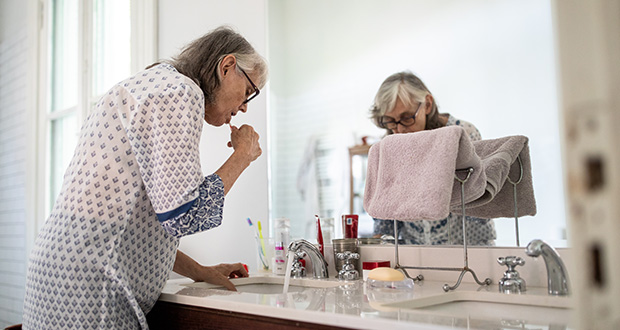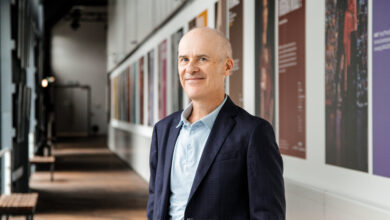Oral health in aged care ‘blind spot’ during pandemic

One of Australia's leading dental associations is urging older people to prioritise check-ups to treat untreated dental decay and gum disease after eased Covid restrictions.
As the pandemic dominated headlines over the past two years, many people delayed or skipped routine dental appointments due to lockdowns and restrictions.
But Australian Dental Foundation's Chairman and Clinical Ambassador, Dr Greg Miller, said he worried people in residential aged care were still not receiving the dental health services they needed.
"Clinicians are seeing more extensive dental disease in aged care than in previous years," Dr Miller said.
"Unfortunately, access to dental healthcare is still a drop in the ocean compared to the level of need."
Aged Care Insite spoke with Dr Miller about how the pandemic has impacted oral health in aged care by limiting access to healthcare services.
ACI: Could you update me on the oral health status in aged care?
GM: If we look at the Australian population as a whole, there has been a significant impact on oral health due to Covid.
The impact has been that attendance patterns have been more irregular, especially in the aged care sector.
Depending on the jurisdiction, the extent of lockdowns, and restrictions, it has been more challenging for individuals to see the dentist.
Unfortunately, any impediment or roadblock impacts service, which is heightened in aged care.
A significant effort is needed to undertake service provision in aged care settings.
So, they usually need a carer or next of kin to attend the dental appointment with the aged care resident.
Often, services are undertaken at the aged care facility.
Now that access and the ability to render services have relatively normalised, we can come back and see the residents in their homes.
But during Covid, many services were limited to emergency services.
That has meant clinicians are seeing more extensive dental disease in the aged care population than in previous years.
In what ways did Covid impact dental services in aged care?
Covid was such a large, significant event that it became front and center in many people's minds.
It was a seminal event, and individuals rightfully focused on that issue.
Letting other things, such as attendance to the dentist by the general population, decrease as well.
Tenant rates also decreased during Covid, and although they have now reverted, that blip on the timeline will cause significant ramifications down the track.
Because if you're not having regular, timely checks, you can't have preventive programs instigated, and you can't intervene in the development of the disease.
For example, if you have tooth decay, and you don't intervene at an early stage, you could end up with a much bigger problem, such as the decay reaching the nerve, the tooth fracturing or becoming painful, or it becoming much more extensive than if seen at an early stage.
So, treatment is paramount, and outreach services to access individuals, especially in their homes, are beneficial for the patients.
What is the number one thing that would help improve oral health for older people at the moment?
The number one action is heightened service provision.
So heightened awareness about the community's issues and access to services in aged care.
I would ask policymakers and the general population to reflect on what it would be like to be in dental pain or suffering significant dental disease and not be able to articulate that issue or have the provision of services that can solve that problem because of access constraints.
Imagine the impact that has on the quality of life.
It's a bleak situation for some individuals in aged care, but it's a real one.
We want to shine a light on it through the foundation's work and be part of the solution.
What is now the greatest issue around oral health in aged care you come across?
The biggest issue is a tendency for families and next of kin to bring chocolates, sweet biscuits, and other sugary foods when they visit their family member.
This is a lovely and caring thing, and it comes from a good place.
But it's like bringing them a pack of cigarettes.
Unfortunately, because of societal norms, these sorts of gifts and social interactions over tea with sweet biscuits or a selection of chocolates have been normalised and are part of our cultural habits.
The problem is that they are terrible for our health, especially when we're older, take multiple medications, and struggle with dexterity while at a heightened risk of disease.
Consistent dosing of teeth with high sugar content will, unfortunately, cause problems.
So one of our main focuses is to emphasise to families, next of kin, and individuals that visit aged care facilities to socialise and interact without bringing things like chocolates and sweet biscuits because of the impacts they can have on the individual's oral health.
When we look at individuals with polypharmacy, meaning they are taking multiple medications, they often experience Xerostomia, also known as dry mouth.
This dry mouth can increase their risk of developing dental diseases such as decay and gum and soft tissue issues because saliva plays a crucial protective and functional role.
If saliva production is reduced due to the impact of medication, their risk of decay is higher.
Did the attendance of a carer or family member during dental appointments make it harder to organise the check-ups?
Not always, but it does depend on the individual circumstance.
If they have physical or mental limitations, oftentimes, the next of kin is present.
Depending on the individual's circumstances, they may have care provided to them by external parties, such as an individual brushing their teeth or providing food.
It's our role to not only check their teeth but also educate their carers on oral hygiene measures, such as how to brush their teeth, ensure that their mouth is maintained healthily, clean dentures, and provide personal care for them.
We also advise the facility and individuals on diet and other measures to help maintain good oral health.
What limitations prevent an older person in residential aged care from seeing a dentist?
Examples of impediments to service across the board include mobility or physical issues, such as being bedbound, which may require significant costs to family members and facility carers.
Then there might also be underlying medical issues that make providing care more difficult.
They may have underlying cognitive issues that make it quite challenging to obtain consent and understand the necessity of oral care.
Additionally, they may desire to be seen but may not have the financial wherewithal to see a private dentist.
Within the public system, it is often very difficult for them to access public services.
Are you at all impacted by the federal government's reforms into aged care?
Look, we are not currently impacted by changes to allied health in aged care.
However, successive governments' efforts significantly impact oral health in aged care.
Oral health is a bit of a blind spot for the government in aged care, which is one of the reasons why the foundation's services have arisen.
There is a heightened need for aged care dental services, but many access-constrained individuals in aged care have relatively poor attendance patterns.
It is often necessary for outreach services to visit the individuals in the aged care facility, and no government service meets the demand.
While there are government services available, the extent of service provision they provide is a drop in the ocean compared to the level of need.
This is where the foundation steps in and is able to provide services to those individuals in a manner that can maintain their oral health and ensure that they have healthy mouths.
Email: [email protected]





